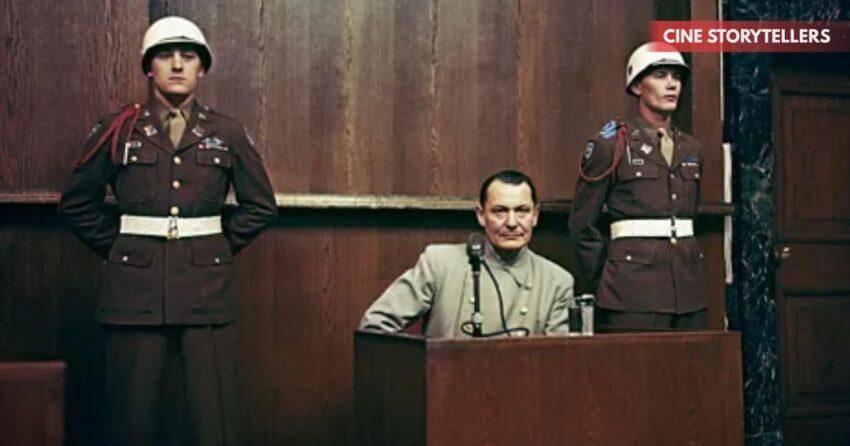In this Nuremberg review, we explore how this compelling film transforms one of history’s most significant trials into an emotionally powerful cinematic experience. Featuring standout performances and a tense courtroom atmosphere, Nuremberg delves deep into justice, morality, and the lingering scars of war. This review dissects its cast, story, direction, and thematic layers, providing a comprehensive look at why it’s one of 2025’s most talked-about historical dramas.
Introduction – A Powerful Courtroom Drama
The Nuremberg review centers around the dramatization of the landmark trials that held Nazi war criminals accountable after World War II. Directed with precision and emotional depth, the film doesn’t just recount the events—it immerses the audience in the moral weight of justice itself. It examines the psychological, political, and ethical dilemmas that emerged when humanity sought accountability for unimaginable crimes.
Through its gripping storytelling and stellar performances, Nuremberg brings history to life, making the audience confront uncomfortable truths about power, law, and conscience.
The Storyline – Justice in the Shadow of War
The film opens with the aftermath of World War II, as nations struggle to rebuild and the world demands justice for the atrocities committed. Set in Nuremberg, Germany, the trials aim to prosecute high-ranking Nazi officials responsible for war crimes and crimes against humanity.
Nuremberg blends historical accuracy with emotional storytelling. It portrays not just the courtroom proceedings but also the internal conflicts of prosecutors, defense lawyers, and witnesses. The moral debate—can justice truly exist after such horror?—forms the film’s backbone.
Nuremberg Review: Cast and Performances
The film boasts an exceptional ensemble cast that delivers performances worthy of its historical significance.
- Michael Shannon brings gravitas and quiet intensity to his role, portraying a man torn between duty and morality.
- Matthew Macfadyen offers a restrained yet deeply emotional performance, embodying the legal and ethical struggle at the heart of the trial.
- Supporting actors add authenticity and nuance, turning courtroom exchanges into riveting, human drama.
Their chemistry and emotional precision elevate the script beyond standard historical retelling, grounding it in the deeply human consequences of war and justice.
Direction and Cinematic Vision
The director handles the complex narrative with meticulous care. Rather than sensationalizing, the film opts for realism and restraint—every scene feels authentic, every silence meaningful.
The cinematography captures the cold austerity of post-war Germany, juxtaposed with the emotional intensity of the courtroom. The muted color palette enhances the somber tone, while the score underscores the moral gravity of each verdict and confession.
Through expert pacing, the film maintains suspense even in dialogue-heavy scenes—a hallmark of great courtroom drama.
Historical Accuracy and Emotional Depth
One of the strongest aspects of this Nuremberg review is the film’s commitment to historical truth. The screenplay draws directly from transcripts and real testimonies from the original trials. However, it also humanizes history—showing not just facts, but feelings.
The movie explores how justice after genocide cannot simply be about punishment—it must confront humanity’s capacity for evil. It’s a sobering reminder that moral responsibility extends beyond political orders or national loyalty.
Themes Explored in the Nuremberg Review
1. The Nature of Justice
Nuremberg asks a profound question: Can justice ever truly balance the scale of atrocity? The film suggests that while the trials sought fairness, the moral reckoning was far more complex.
2. Guilt and Responsibility
Characters wrestle with personal and collective guilt—how much responsibility lies with individuals versus systems of power?
3. Truth and Denial
Through witness testimonies and confessions, the film highlights the human instinct to deny, justify, or distort the truth—a theme that resonates strongly in today’s political climate.
Why This Nuremberg Review Stands Out
Unlike previous adaptations, this Nuremberg review emphasizes emotional truth as much as historical detail. It humanizes both victims and perpetrators, avoiding black-and-white portrayals.
It’s not just a film about war crimes—it’s about moral courage, empathy, and the fragile pursuit of justice. The dialogue-driven intensity keeps viewers engaged while prompting reflection on modern parallels.
Critical Reception and Audience Impact
Critics have praised Nuremberg for its emotional realism and nuanced storytelling. The film’s authenticity and pacing have been described as “hauntingly powerful.”
Audiences have also responded positively, appreciating its historical insight and moral complexity. It’s being hailed as one of the most thought-provoking releases of 2025, sparking renewed discussion about international law and moral accountability.
Final Verdict: A Must-Watch Historical Masterpiece
In conclusion, this Nuremberg review reveals a film that stands as both a gripping courtroom drama and a profound moral lesson. The performances of Michael Shannon and Matthew Macfadyen, combined with the director’s unflinching realism, make Nuremberg a must-watch for anyone interested in history, justice, or the human condition.
It’s not just about what happened—it’s about how humanity responds to its darkest chapters.
Also Read : General Hospital Cast Changes 2025: New Arrivals, Departures, and Storyline Shifts
FAQs About Nuremberg Review
Q1. What is the movie Nuremberg about?
Nuremberg dramatizes the post-World War II trials of Nazi leaders, focusing on the pursuit of justice and the moral challenges faced by those involved.
Q2. Who stars in the film Nuremberg?
The film features Michael Shannon and Matthew Macfadyen in powerful leading roles, supported by an impressive ensemble cast.
Q3. How accurate is the Nuremberg movie?
The movie stays close to historical records and transcripts, blending factual accuracy with emotionally resonant storytelling.
Q4. What makes this Nuremberg review unique?
This review highlights the film’s moral complexity, exceptional performances, and its timeless message about accountability and truth.
Q5. Is Nuremberg worth watching?
Absolutely. It’s one of the year’s most compelling films—intense, intelligent, and emotionally moving.
Join our WhatsApp channel for more updates and information about celebrities and entertainment

I’m Atul Kumar, founder of Cine Storytellers and an entertainment creator with 5+ years of experience. I cover films, celebrities, music, and OTT content with a focus on accurate, ethical, and engaging storytelling. My goal is to bring readers trustworthy entertainment news that informs, inspires, and goes beyond gossip.
Discover more from Cine Storytellers
Subscribe to get the latest posts sent to your email.
